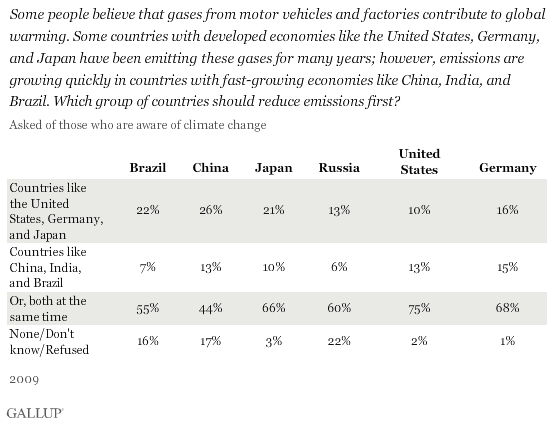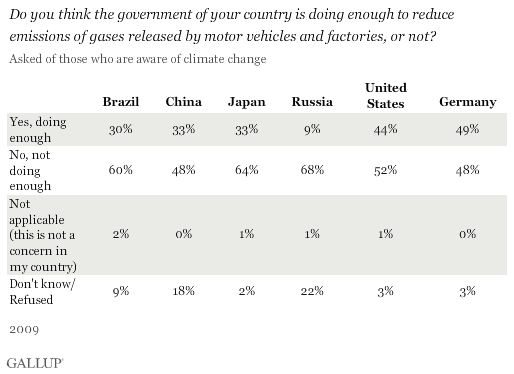WASHINGTON, D.C. -- Negotiations over industrialized and developing countries' commitments to emissions reductions remain deadlocked as the Copenhagen climate summit enters its final 48 hours. Gallup surveys in 2009 find respondents in six key global economies are more likely to say developed economies such as the U.S., Germany, and Japan and fast-emerging economies such as China, India, and Brazil should reduce emissions at the same time than say one group should reduce emissions first.

Under the Kyoto protocol, many industrialized countries committed to reducing emissions, as these countries have historically been the largest contributors. Developing countries, where emissions are expected to increase the most over the next two decades, were largely exempt from such commitments. Although not a signatory to the Kyoto agreement, the United States has maintained that the next international climate agreement must include serious commitments from fast-growing economies such as China.
In Brazil, China, Japan, Russia, and the United States, the most common response among residents who know at least something about climate change is that developed and developing countries should reduce emissions at the same time. Three-quarters (75%) of Americans say both sets of countries should reduce emissions simultaneously -- the highest percentage among residents of the six countries holding this view. Less than a majority of Chinese respondents (44%) say both should reduce emissions, but they are still more likely to say this than choose the other options.
Among the remaining respondents who say one group of countries should cut emissions first, those in Brazil, China, Japan, and Russia are more likely to say developed economies should reduce emissions first. By contrast, residents in the U.S. and Germany are equally divided between those saying developed economies should act first and those saying fast-growing economies should act first.
Satisfaction With Current Efforts to Reduce Emissions
Overall, residents who are aware of climate change in all six countries tend to believe that their respective government's efforts to reduce emissions are insufficient. At least 6 in 10 in Brazil (60%), Japan (64%), and Russia (68%) who are aware of climate change say their governments aren't doing enough. Roughly half of respondents in China (48%), Germany (48%), and the United States (52%) share this view.

Americans and Germans are generally more divided about their governments' efforts than are those in the other countries, with nearly half crediting their own country with doing enough. Interestingly, Russians are the least likely to say their government is doing enough to reduce emissions, with fewer than 1 in 10 expressing this.
Bottom Line
Much of the difficulty in forging international agreements on climate change involves bridging the developing world's demand that they be held to less stringent emissions standards with the larger goal of starting to reduce overall greenhouse gas emissions worldwide. Gallup data find many residents in key developing as well as industrialized countries think their own countries can do more to reduce emissions, and they think developed and developing countries should work simultaneously toward that goal.
For complete data sets or custom research from the more than 150 countries Gallup continually surveys, please contact worldpollpartners@gallup.com or call 202.715.3030.
Survey Methods
Results are based on face-to-face and telephone interviews with a sub-sample of adults who say they know something or a great deal about climate change or global warming, aged 15 and older, conducted in 2009 in Brazil, China, Germany, Japan, Russia, and the United States. For results based on the total sample of national adults, one can say with 95% confidence that the maximum margin of sampling error ranged from a low of ±2.8 percentage points in China to a high of ±5.5 percentage points in the United States. The margin of error reflects the influence of data weighting. In addition to sampling error, question wording and practical difficulties in conducting surveys can introduce error or bias into the findings of public opinion polls.
